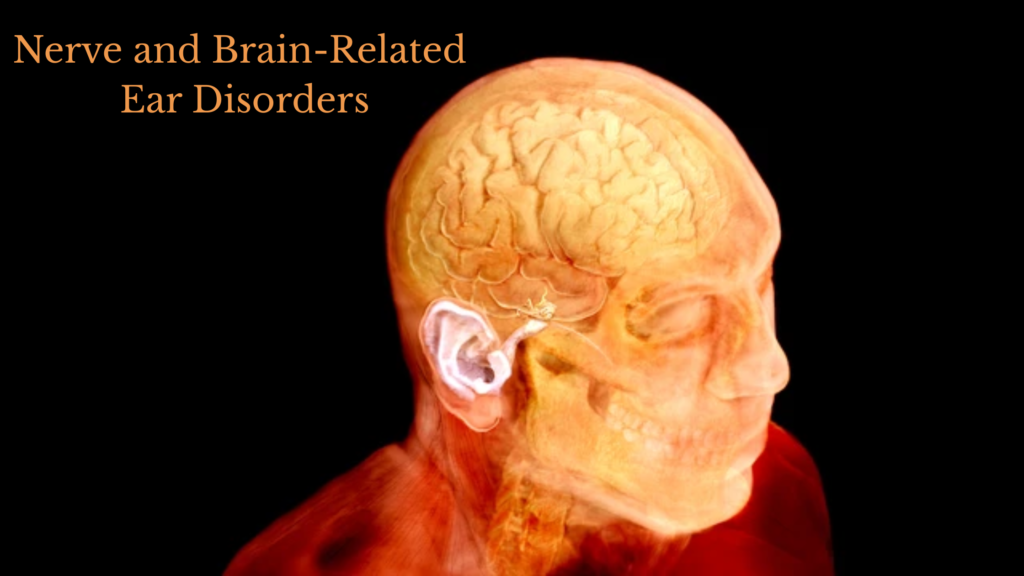🧠👂 Nerve and Brain-Related Ear Disorders – Overview
Some ear disorders are caused by problems with the auditory nerve, vestibular nerve, or parts of the brain responsible for hearing and balance. These are known as neuro-otologic disorders and often involve hearing loss, tinnitus, dizziness, or balance problems.
🧾 Common Nerve & Brain-Related Ear Disorders
1. Sensorineural Hearing Loss (SNHL)
- Cause: Damage to the inner ear (cochlea) or auditory nerve (CN VIII)
- Common causes: Aging (presbycusis), noise exposure, infections, tumors, genetic conditions
- Symptoms: Permanent hearing loss, difficulty understanding speech
- Treatment: Hearing aids, cochlear implants (if severe)
2. Vestibular Neuritis
- Cause: Inflammation of the vestibular nerve (controls balance), often viral
- Symptoms: Sudden severe vertigo, nausea, imbalance, no hearing loss
- Treatment: Vestibular suppressants, anti-nausea meds, physical therapy
3. Labyrinthitis
- Cause: Inflammation of the inner ear and vestibular nerve (usually viral or bacterial)
- Symptoms: Vertigo + hearing loss + tinnitus
- Treatment: Rest, medications, sometimes steroids
4. Acoustic Neuroma (Vestibular Schwannoma)
- Cause: Benign tumor on the vestibulocochlear nerve
- Symptoms: Gradual hearing loss (one ear), tinnitus, imbalance, facial numbness
- Diagnosis: MRI with contrast
- Treatment: Monitoring, surgery, or radiation therapy
5. Multiple Sclerosis (MS)
- Cause: Autoimmune demyelination of the brain and spinal cord
- Ear-related symptoms: Sudden hearing loss, dizziness, imbalance, tinnitus
- Diagnosis: MRI and neurological evaluation
- Treatment: Steroids during attacks, MS-modifying medications
6. Auditory Neuropathy Spectrum Disorder (ANSD)
- Cause: Disrupted transmission of sound from inner ear to brain
- Symptoms: Hearing may appear normal on tests but speech understanding is poor
- Diagnosis: Requires specialized tests like ABR and OAE
- Treatment: Hearing aids, cochlear implants, auditory training
7. Central Auditory Processing Disorder (CAPD)
- Cause: Brain has trouble processing sound despite normal hearing ability
- Symptoms: Difficulty understanding speech in noisy environments, poor listening skills
- Common in children and sometimes adults
- Treatment: Auditory training, speech therapy, classroom accommodations
8. Meniere’s Disease
- Cause: Fluid imbalance in the inner ear
- Symptoms: Episodic vertigo, hearing loss, tinnitus, ear fullness
- Treatment: Salt restriction, diuretics, anti-vertigo meds, surgery in severe cases
🧠 Diagnosis Tools
- Audiometry (hearing test)
- Brainstem Auditory Evoked Response (BAER/ABR)
- MRI (to rule out tumors or MS)
- Vestibular testing (VNG, ENG)
- Neurological exams
🛡️ When to See a Specialist
See an ENT or neurologist if you experience:
- Sudden hearing loss
- Persistent vertigo or imbalance
- Tinnitus in one ear
- Facial numbness or weakness
- Difficulty understanding speech with normal hearing
